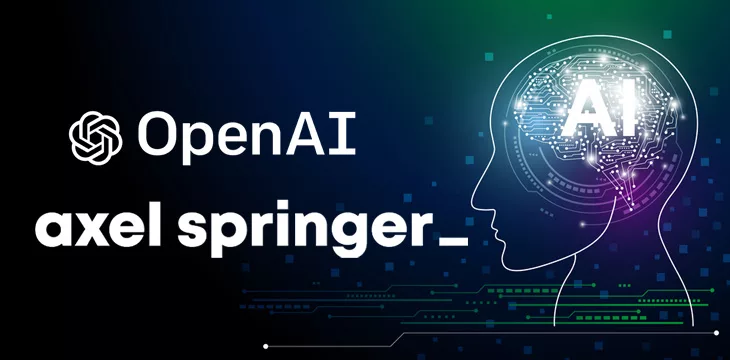|
Getting your Trinity Audio player ready...
|
OpenAI has teamed up with media and technology company Axel Springer to further intertwine artificial intelligence (AI) and journalism.
“This partnership with Axel Springer will help provide people with new ways to access quality, real-time news content through our AI tools,” said Brad Lightcap, COO of OpenAI. “We are deeply committed to working with publishers and creators around the world and ensuring they benefit from advanced AI technology and new revenue models.”
Content produced by the Axel Springer team, including media brands iPolitico, Business Insider, and European properties Bild and Welt, will be integrated into OpenAi’s ChatGPT to enrich the AI’s responses with well-informed and current news summaries.
This means that ChatGPT users can expect better outputs that include citations and direct links for deeper insights into topics. In addition to works that reference current events, the content from Axel Springer will be used to train OpenAI’s language models further.
“We are excited to have shaped this global partnership between Axel Springer and OpenAI – the first of its kind,” said Mathias Döpfner, CEO of Axel Springer. “We want to explore the opportunities of AI-empowered journalism – to bring quality, societal relevance, and the business model of journalism to the next level.”
ChatGPT users will benefit from this collaboration the most, as integrating Axel Springer news content into ChatGPT means that users can access reliable, up-to-date information tailored to their individual queries.
Businesses will experience these same benefits, but it would not be surprising to see them try to emulate this partnership with other AI model providers, exploring partnerships with AI firms to capitalize on AI-driven distribution strategies.
OpenAI announces superintelligent AI grant program
After announcing its partnership with Axel Springer, OpenAI unveiled its Superalignment Fast Grants, In collaboration with Eric Schmidt, the former CEO of Google (NASDAQ: GOOGL).
OpenAI believes that superintelligent AI systems could emerge within the next decade. To accelerate and support these systems coming online, it has launched a grant program to aid in their creation.
We're announcing, together with @ericschmidt: Superalignment Fast Grants.
$10M in grants for technical research on aligning superhuman AI systems, including weak-to-strong generalization, interpretability, scalable oversight, and more.
Apply by Feb 18! https://t.co/eCKwZWLSZE
— OpenAI (@OpenAI) December 14, 2023
The “Superalignment Fast Grants” program commits $10 million to support research focused on ensuring the alignment and safety of superhuman AI systems.
This cooperation aims to tackle the current AI alignment strategies, like reinforcement learning from human feedback (RLHF), which might fall short in managing future AI systems. The complexity and creativity of superhuman AI is likely to surpass human comprehension.
For instance, evaluating the safety of highly sophisticated code produced by these AI systems could be beyond human capacity. This raises the question: how can humans effectively guide and trust AI systems that are significantly more intelligent than themselves?
OpenAI is trying to get ahead of this issue and is asking the public to help them solve it through its grant program.
The program offers grants ranging from $100,000 to $2 million to academic labs, nonprofits, and individual researchers. It also includes a unique one-year $150,000 OpenAI Superalignment Fellowship for graduate students, comprising a stipend and research and computing resources funding.
The Superalignment Fast Grants program is particularly interested in funding research in the following areas:
- Weak-to-Strong Generalization: Understanding and controlling how models generalize from weak supervision.
- Interpretability: Developing methods to decipher AI model internals, potentially leading to tools like AI lie detectors.
- Scalable Oversight: Creating AI systems that assist in evaluating other AI systems’ outputs on complex tasks.
- Other Critical Directions: Including honesty, chain-of-thought faithfulness, adversarial robustness, evaluations, and more.
OpenAI encourages participation from researchers new to AI alignment to attract fresh talent and ideas to this emerging field. The organization believes that fresh perspectives can shape the future of AI alignment research and play a crucial role in AI development.
Applications will close on February 18, and OpenAI says it will get back to each applicant within four weeks of applications closing.
Strategic AI announcements before the holidays
In the lead-up to the holiday season, key players in the AI arena, including Google,
Microsoft (NASDAQ: MSFT), Meta (NASDAQ: META), Intel (NASDAQ: INTC), and OpenAI, have strategically announced new AI features, apps, and services.
There’s a good chance that these announcements are more than a coincidence; each company is probably looking to capitalize on the upcoming holiday break when software developers and tech enthusiasts are more likely to have the time to experiment with these new AI models.
In order for artificial intelligence (AI) to work right within the law and thrive in the face of growing challenges, it needs to integrate an enterprise blockchain system that ensures data input quality and ownership—allowing it to keep data safe while also guaranteeing the immutability of data. Check out CoinGeek’s coverage on this emerging tech to learn more why Enterprise blockchain will be the backbone of AI.
Watch: Artificial intelligence needs blockchain

 07-18-2025
07-18-2025 





